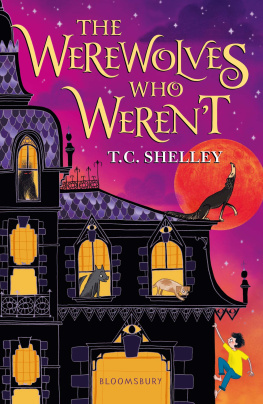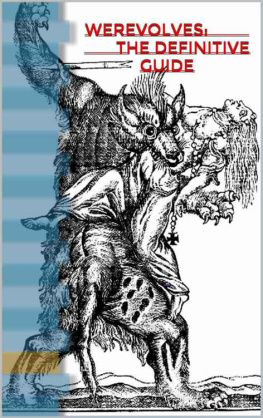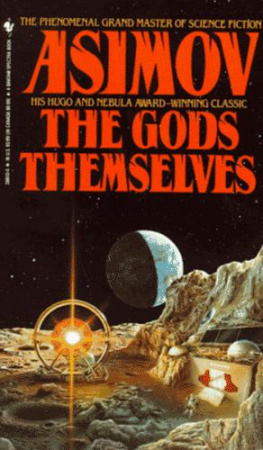James Enge
The Wolf Age
The third book in the Ambrose series

In Memoriam Pajrida PfuIjds ip: a stranger here, a citizen there

Patria splendida terraque florida, libera spinis, danda fidelibus est ibi civibus, hic peregrines.
Spear-age, Sword-age:
Shields are shattered,
Wind-age, wolf-age:
Before the word founders
Men will show mercy to none.
VOL USPA

PART ONE:
RAIDERS OF WURUVAARIA
AMONG WOLVES, BE WOLVISH OF COURAGE.
LYDGATE
Chapter One: Council of the Gods
Listen, lacomes. This is what I see.
The Strange Gods were gathering by the Stone Tree, but Death and her sister justice had not yet appeared. Justice, they knew, would not, but they expected Death to be there before them and War was angry.
"I swear by myself," War signified, indicating by a talic distortion that the oath was not sincere or binding, "Death is the strangest of the Strange Gods. She pervades the mortal world, but she can't manifest herself anywhere within a pact-sworn juncture of space-time!"
"I am here," Death signified.
Now that they noticed her presence among them, the Strange Gods realized she had been implicit in a fold of local space-time all along, and simply had not chosen to reveal her presence to them. The other gods signified nontrivial displeasure with her.
Death indicated indifference and readiness to begin the pact-sworn discussion.
The Strange Gods did not submit to a ruler. In their discussions, it was common for the weakest of them to preside. So Mercy manifested herself more intensely than she would normally have done, and reminded them of their mission to destroy the werewolf city Wuruyaaria and how it was currently imperiled.
"It is Ghosts-in-the-eyes," signified Wisdom. "They are a powerful maker and necromancer-a master of all the arts we hate. Our instrument will destroy the city"-Wisdom indicated a pattern in events they all under- stood-"but now unless we find a way to bring down the walls of Wuruyaaria more swiftly, our instrument may also destroy great swathes among our worshippers. This goes against our nature and cannot be accepted."
Other gods indicated agreement.
Death indicated chilly amusement: a laugh. "The werewolves will die," she signified. "Their city will die. Our worshippers will die. Our instrument will die. Everything that lives must die. When the last soul is severed, this world will collapse into its component elements and drift away in pieces, flotsam on the Sea of Worlds. All this will happen in time: let events take whatever course they will, this is their destination. If this goes against our nature, our nature is doomed."
Each of the other gods emanated anger that would have killed a material being. It was uncivil of Death to prate about these matters that were well known to every god. If Death felt any discomfort from their emanations, she didn't show it. Her next comment was more immediately helpful, though.
"I have a kind of solution to propose," Death signified. "I would have effected it already, but the consequences will affect our pact-sworn efforts to destroy Wuruyaaria."
Mercy signified a need for more details; other gods echoed her.
Death indicated a trivial detail in the pattern of events: the death of a man named Morlock.
The gods expressed indifference.
Death changed the detail's position in time-space.
The gods meditated on the new potential patterns of events, a flowering of dark futures springing from this one seed.
Most of the gods expressed surprise. Cruelty chuckled a bit, slowly shaking his heavy, many-toothed head.
Death again changed the detail's position in time-space. The manifold patterns of things-to-be changed even more radically.
"How can this be?" signified War. "Men and women die every day and their deaths do not matter." Mercy signified some restlessness at this, but the Strange Gods were used to ignoring the endless quarrel between War and Mercy.
"The progress of our plan in the as-things-are moves very slowly," Death signified. "There is a tension of powers: our instrument; the pact binding our powers in this nexus of events; that damned sorcerer, Ghosts-in-the-Eyes; the natural forces we do not control; and so on. If we disrupt that tension, unbalanced powers will unleash events like a torrent."
Wisdom emanated concern, a need to wait. They did wait as he juggled futures in various shapes, pondering the uncertain effects of varying causal chains. "I cannot chart the path of this torrent," he signified finally to Death and to his peers. "It may benefit our pact-sworn intention or harm it."
"We must guide the torrent," signified War with obvious eagerness.
"We can't," Wisdom signified bluntly. "If we break our sworn intention we will be adrift in the torrent, effecting local changes within it but unable to determine its course. Each change will create new and interacting series of causation. There is certainty in our pact of sworn intention. In this other there is only chaos."
The Strange Gods, as one, made a symbol of protection against the name of this alien god. It had shocked them, as Wisdom intended, lending an unusual force to his signs.
"Certainty only of failure," Cruelty signified. "I was against the proposed instrument from the beginning. It is clear now that I was right and others were wrong. Why should the pact be sacred? Only our wills are sacred, or we are not gods."
"The pact is our will," signified Loyalty. "It is our will united to act as the Strange Gods. To break that is to blaspheme against ourselves." He continued for some time and stopped only when he visualized that the assembly was against him.
Everything he signified was true, but they would not accept failure. On the other hand, Wisdom had frightened them with his tomorrow-juggling and his metaphorical torrents.
"I propose a compromise," signified Stupidity. "Death alone will be freed from the pact-oath. The rest of us will abide by it. That should reduce the chaos in events." The Strange Gods impatiently made again the symbol of protection against the name of Chaos. Stupidity's use of Wisdom's trope emanated contempt and mockery, as was his intent. The gods were annoyed with Stupidity, but he did succeed in making them think less of Wisdom. Suddenly, Wisdom's fears seemed less wise, more fearful.
"That hardly matters," Wisdom signified warningly, but the gods were not prepared to listen. They wanted to do something, and this compromise allowed them the illusion of keeping to their plan even as they adopted a new one.
The compromise, in the end, was assented to by all the Strange Gods (except justice), and Death alone was released from the pact.
"I go," signified Death, and ceased to manifest herself.
The rest of the Strange Gods stood conferring worriedly under the Stone Tree until the sun rose in the west and they fled like ghosts to hide with the darkness underground.
Chapter Two: Death By Water
Morlock Ambrosius shuffled the deck and dealt again. He was sitting by the side of an empty field on the great northern plain, using the surface of a broad stump as a card table.
He threw a set of cards in a spiral pattern, crossed each card with another drawn from the pack, and then sat back to contemplate them. He again saw the drowned sailor, crossed by the Death card, the Lady of the Rocks. There were some variations: the one-eyed merchant bore the blank card of Mystery, the Wheel was crossed by the man with three wands looking out to sea. This was the third time he had thrown the cards, and each time they had prophesied the same fate: death by water.








